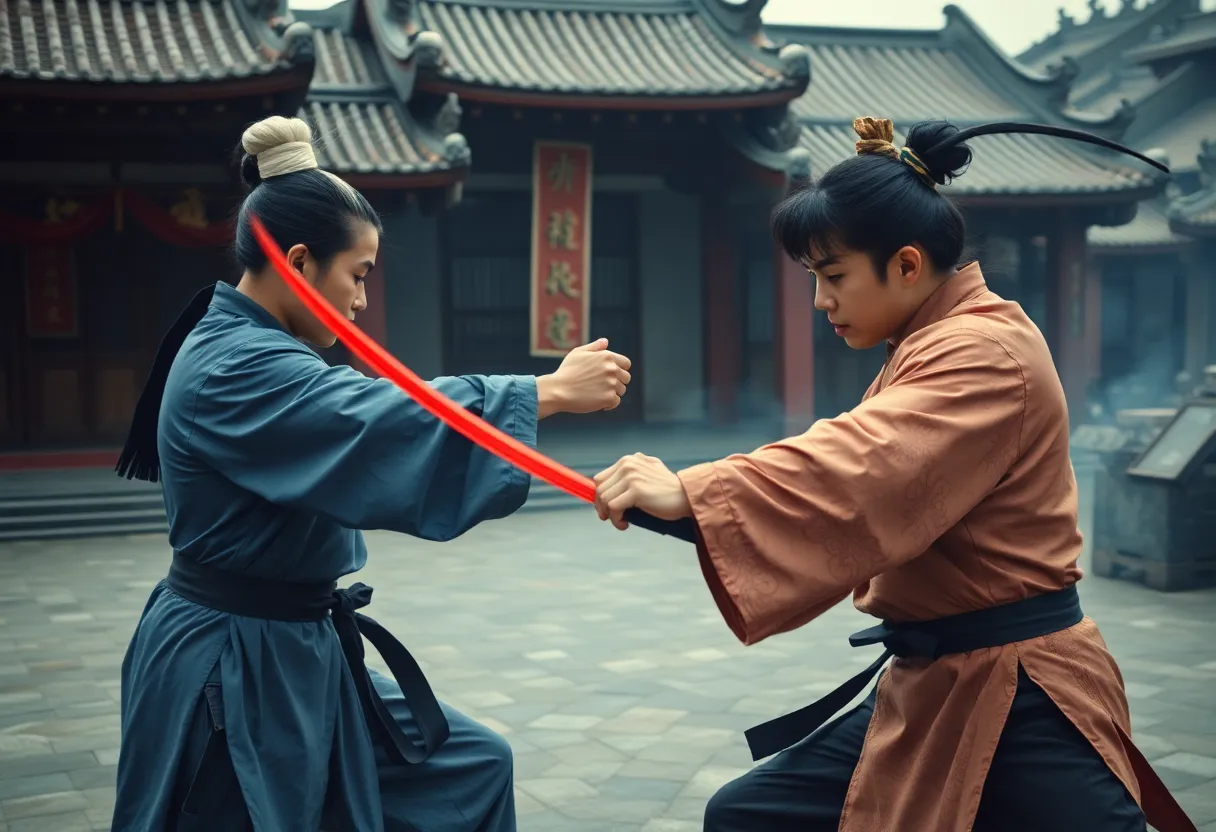News Summary
The China Film Foundation plans to rejuvenate 100 classic kung fu films using artificial intelligence. The initiative aims to enhance cultural storytelling by reinterpreting beloved titles, with collaborations for adaptations by AI companies. Technological integration promises immersive experiences in film, while public sentiment on AI diverges significantly between China and the US. As AI continues to impact film production, China’s kung fu revival could foster innovation and position its cinema on the global stage.
Shanghai, China – AI to Revitalize Iconic Kung Fu Classics
The China Film Foundation is embarking on an ambitious project to rejuvenate 100 classic kung fu films using artificial intelligence. This undertaking aims to breathe new life into beloved titles like Police Story, Once Upon a Time in China, and Fist of Fury, which feature iconic stars such as Jackie Chan, Jet Li, and Bruce Lee respectively. The initiative is part of a broader effort to leverage technology in enhancing cultural storytelling in cinema.
To facilitate this project, the foundation will collaborate with various businesses, including Shanghai Canxing Culture & Media Co., to license 100 Hong Kong films for adaptation by AI companies. The revitalization project will include opportunities to explore innovative storytelling methods, particularly through animation. This includes plans for an animated reinterpretation of John Woo’s classic 1986 film A Better Tomorrow, which will utilize AI to emulate the director’s distinctive visual style.
Technological Integration and Cultural Storytelling
Zhang Pimin, the chairman of the China Film Foundation, highlighted the essential role of technology in preserving and revitalizing cultural narratives during an address at the Shanghai International Film Festival. Embracing AI presents an opportunity for the Chinese film industry to enhance viewing experiences through features like immersive bamboo forest duels that encapsulate key thematic philosophies.
Meanwhile, the entertainment landscape in Hollywood is grappling with its own challenges regarding AI’s role in filmmaking. As studios seek ways to cut costs, concerns arise from actors, directors, and crew about the implications of AI adoption. The Directors Guild of America perceives AI as a creative tool meant to enhance rather than replace a filmmaker’s innate vision. Nonetheless, U.S. artists have expressed fears about AI’s potential negative impacts on their work and rights, which has led unions like SAG-AFTRA to advocate for protective measures against job displacement and rights infringement.
Public Trust and Cultural Perspectives
Public sentiment toward AI varies significantly between China and the United States. Surveys indicate that 83% of respondents in China trust AI to serve societal interests, contrasting sharply with only 37% of Americans who feel the same way. This discrepancy may influence the adoption and integration of AI technologies in each country’s creative industries.
As the foundation moves forward with its AI-driven projects, notable figures in the film industry have raised questions regarding their involvement. For instance, Bruce Lee Enterprises was not informed about the AI initiative and is currently seeking more information. Similarly, John Woo himself expressed surprise at the announcement of an AI remake of his film A Better Tomorrow.
The Future of Film Production in China
China’s efforts include expanding the kung fu revival project into other domains, such as developing a martial arts video game. The Chinese film industry has dramatically evolved over recent decades, with local productions now frequently dominating the box office. Critics suggest that the country’s willingness to utilize AI in socially relevant films positions it favorably in appealing to global audiences.
AI-generated films promise to significantly reduce production costs, which would open doors for independent filmmakers to create and distribute their work more freely. Currently, AI technology is already employed in China for various aspects of filmmaking, including script development, content moderation, and translation, enhancing efficiencies during visual effects postproduction.
As competition intensifies between the U.S. and China in the AI domain, each country’s approach to integrating AI into their entertainment sectors will likely reflect broader cultural and industrial strategies. For the China Film Foundation, the revitalization of kung fu classics represents not just a tribute to the genre’s legacy, but also a strategic maneuver to position Chinese cinema as a global leader in innovative storytelling.
Deeper Dive: News & Info About This Topic
HERE Resources
Additional Resources
- Fast Company: Is This Hollywood’s Moment of AI Reckoning?
- Wikipedia: Artificial Intelligence
- The Verge: Asteria, Bryn Mooser, Uncanny Valley, and Gen AI
- Encyclopedia Britannica: AI in Filmmaking
- Newsweek: The Rise of AI and the End of Hollywood as We Know It
- Google News: AI in Hollywood
- New York Times: AI in Hollywood Movies and CGI
- Google Search: Hollywood AI Transformation
- Deadline: Clean AI and Hollywood Transformation
- Google Scholar: AI in Film Production

Author: STAFF HERE BEVERLY HILLS WRITER
The Beverly Hills Staff Writer represents the experienced team at HEREBeverlyHills.com, your go-to source for actionable local news and information in Beverly Hills, Los Angeles County, and beyond. Specializing in "news you can use," we cover essential topics like product reviews for personal and business needs, local business directories, politics, real estate trends, neighborhood insights, and state news affecting the area—with deep expertise drawn from years of dedicated reporting and strong community input, including local press releases and business updates. We deliver top reporting on high-value events such as the Rodeo Drive Concours d'Elegance, the Beverly Hills artSHOW, Concerts on Canon, and holiday celebrations throughout the city. Our coverage extends to key organizations like the Beverly Hills Chamber of Commerce and Visit Beverly Hills, plus leading businesses in luxury fashion, hospitality, and entertainment that drive the local economy. As part of the broader HERE network, including HERELosAngeles.com, HERESantaAna.com, HEREHuntingtonBeach.com, and HERECostaMesa.com, we provide comprehensive, credible insights into Southern California's dynamic landscape.



